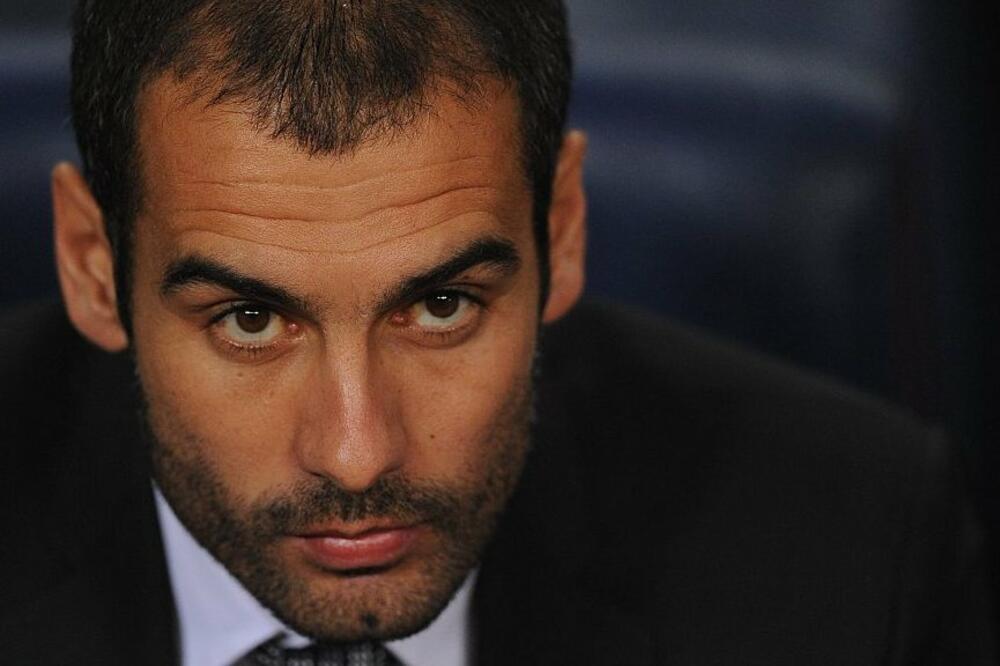One decision from the past could have led to two very different and historic outcomes.
In 1998, the Hollywood film starring Gwyneth Paltrow coined the phrase "Doors of Destiny" (Sliding Doors) into the popular dictionary.
Ten years later, the Door of Destiny opened, and on the football field.
- Asim Ferhatović Hase, the story of the "prototype of Sarajevo" who "played football out of curiosity"
- Robert Prosinečki, the new coach of Montenegro: "We can play against anyone"
- The fight against racism in football: Automatic defeat of the team whose fans are insulting
In the summer of 2008, Barcelona, under the leadership of Frank Rijkaard, was a club in stagnation, on the verge of serious decline.
A second season without a trophy in a row ended with Barca in third place in La Liga and a slouch at the Bernabeu.
After Real Madrid were confirmed as champions a few days earlier, Barcelona had to pay their respects to their eternal rivals at home before the meeting in the league.
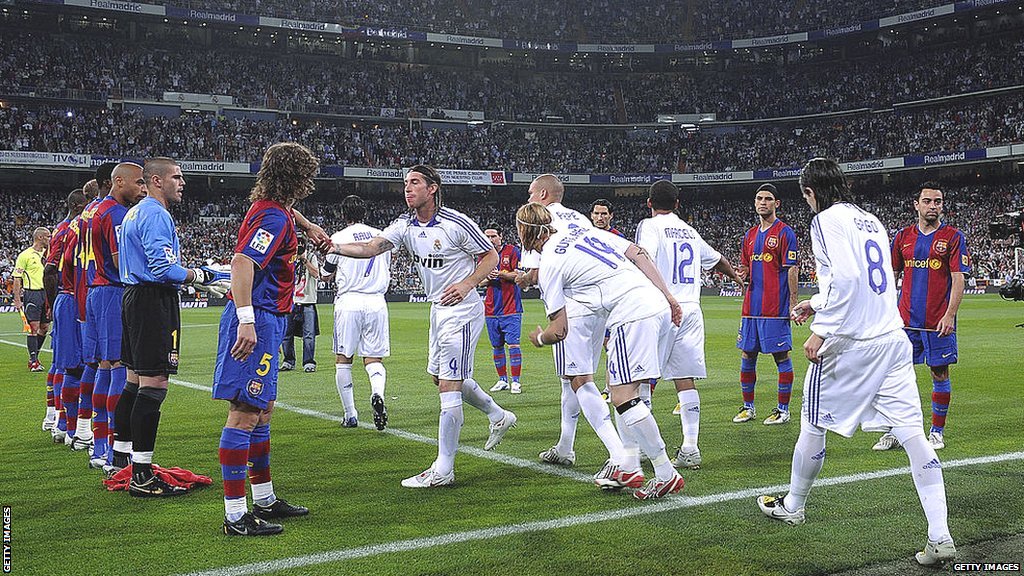
The humiliation didn't end there.
A 4-1 thrashing followed, with Madrid fans chanting: "Laporta stay, please!" at Barça president Joan Laporta, who was under a lot of pressure.
Off the field, dressing room star Ronaldinho spent more time in the city's nightclubs than putting balls into the net.
The discipline of the team seemed to have healed, and there were even stories about how the Brazilian was left to sleep after the night before, instead of harnessing him in training.
Questions about Ronaldinho's weight gain and tendency to go out graced the front and back pages of the Barcelona papers, while at press conferences every question addressed to Rijkaard contained the word "resignation".
And while the teasing of the Madrid fans was still ringing in his ears, Laporta gave his own answer.
Less than 24 hours after the humiliation in Madrid, Rijkaard was fired.
But who will replace him?
At the top of the list of potential replacements, and at the very top of every football pragmatist's list, was Jose Mourinho.
Mourinho has had a positive relationship with the club in the past as an assistant to previous coaches Bobby Robson and Louis Van Gaal.
He also had a CV stronger than anyone else in Europe at the time, with UEFA Cup and Champions League triumphs with Porto, and a string of undisputed Premier League titles with Chelsea.
But instead of opting for an A-list football celebrity, Barcelona opted for someone from the B-list.
And literally.
- Shock at Anfield: Klopp leaves the Liverpool bench at the end of the season
- How a British laboratory saved Pele's football boots
They selected the coach of their own B team, who was completely unproven at the top level and who had spent the previous season - his first as boss - in Spain's fourth division and the Catalan regional division.
The decision?
Choose Pep Guardiola instead of Mourinho.
To better understand why and to understand the essence of the decision that changed football, we need to dig deeper into the DNA of Barcelona, where the primary motivator is poetry and not pragmatism, and one man's methods, opinions and instincts take precedence over all. other.
As the BBC Sport documentary, Pep Guardiola: In Search of Perfection, shows, to understand Pep you have to understand Johan Cruyff.
Cruyff is synonymous with Barcelona, winning La Liga in 1974 and the Copa del Rey in 1978 as a player, before lifting four consecutive Spanish league titles and the European Cup as a coach between 1988 and 1996.
And Cruyff had an incredible impact on Guardiola's career.
It was Cruyff who plucked the 1990-year-old Guardiola from Barcelona's reserve team in 19 and catapulted him into an invincible first team full of world stars such as Mikael Lovedrup and Ronald Koeman.
Cruyff saw lasting quality in Guardiola in his teenage years.
Spanish journalist Lou Martin knows Guardiola better than most, having penned his little-known 2001 book La Meva Gent, El Meu Futbol (My People, My Football, in Catalan) as a shadow writer.
"In Catalonia we say 'seny' and 'rauxa'. [Barcelona's legendary captain Karl Pujol has a 'raux' - an impulse, a drive," says Martin.
"'Seny' - the brain - in Barcelona was Pep.
"Pep breathed meaning into the team - because Pep could understand everything Johan wanted from him."
"Johan had two sons. Jordi, son by blood, and sports son... Pep."
Jordi Cruyff agrees with Martin's assessment of the close relationship between his father and Guardiola.
Jordi recalls how his father had absolute faith in Guardiola as a new hope among coaches after his protégé ended his playing career with disappointing spells at Brescia, Roma, Al Ahli and Mexican side Dorados.
"I know at that time Pep and my father were in frequent contact," says Jordi Cruyff, referring to the months following Guardiola's retirement from the game in 2006.
"I think my father has a kind of intuition when it comes to judging who will turn out to be a good coach."
A common criticism of Guardiola has been that all three of his biggest coaching jobs - Barcelona, Bayern Munich and Manchester City - have been at clubs with big star players and deep pockets.
The implication is that the Spaniard cannot produce his characteristic magic in a smaller, more modest setting.
But it cannot be much less than in Barcelona B.
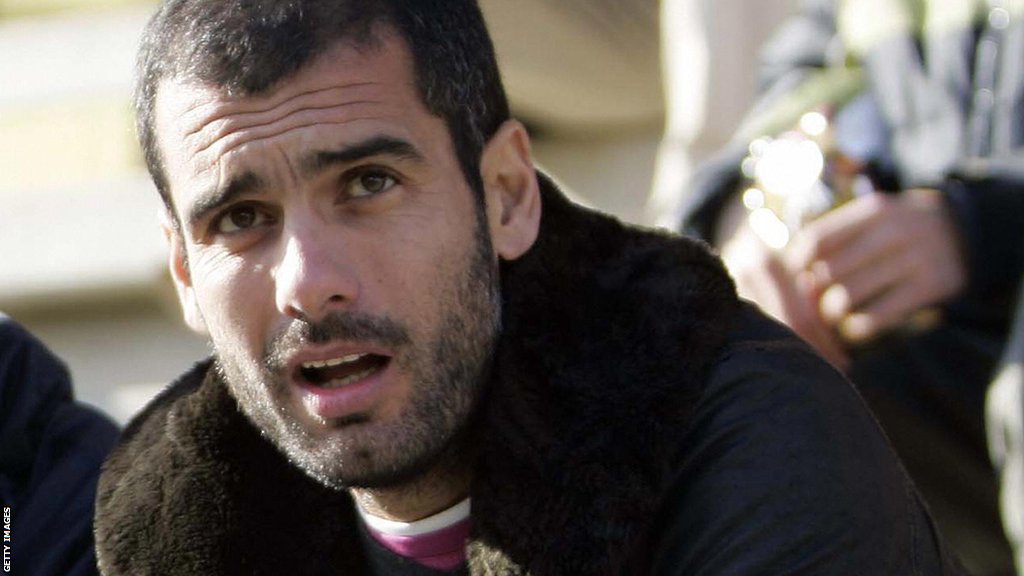
"Yes, I was a player, but I will start from scratch as a coach," Guardiola, then 37, said at his first press conference in charge of Barcelona B.
It was a big surprise that he accepted the job, bearing in mind that he was also offered the role of head of the academy - which is perceived as more prestigious.
However, Barcelona B, like Guardiola, started from scratch.
Last season, they were relegated after failing to win their last 10 matches.
Guardiola's first game as boss was a pre-season friendly on a small, artificial pitch against Banjoles.
Small pitches and, when the games were played on grass, uneven surfaces, were a common theme of difficult beginnings in coaching life.
Barcelona B won one of their first three games.
After a 2-0 defeat to lower ranked Manresa, who were eventually relegated, Guardiola endured his first crisis of faith.
Can his style of play - prioritizing possession over fielding - thrive in the tough conditions of the fourth division?
By the time he arrived at training on Wednesday after that loss, he had already made up his mind.
"I thought we had to change because the pitches are so small," he says.
"For two days I was consumed by doubts. But at that moment I broke - if we can win and play pretty good football on a small pitch, then I can do the same at a higher level with better players and on better pitches.
Watch the video: How a housewife fell in love with cricket in the eighth decade
"I came to practice and said, 'This is what I believe.' The alternatives, the ways of change that we considered, were not convincing to me. And because of that, I couldn't change.
"It was an important moment, because I was new, I had no experience. At 37 years old, I have never managed the big players. I had to prove myself."
One man he didn't have to ask to prove himself was Domenek Torrent.
Torrent was the coach of Girona, a rival club from the fourth division.
When Guardiola, the man he admired as a player, knocked on his door, Torrent immediately accepted the opportunity to join him.
Torrent spent 11 years with Guardiola as his assistant, leaving Manchester City for the role of head coach at New York City FC in 2018.
"I always say that Pep has enormous powers of seduction," he says.
"He is someone who can convince the players in his daily work with them. He is a sponge.
"He finds out everything about everyone very quickly.
"He turned Barcelona B into a very compact team that played very good football. And he conveyed to the players ideas that were completely different from anything they had seen before.
"It is true that we have built a very good team.
Sergio Busquec, Pedro and Thiago Alcantara were newcomers to that team, and Guardiola was the uncompromising, unrelenting, ruthless driving force at its centre.
Professionalism was turned to the maximum.
Opposing teams were scouted and analyzed on video, to a level of detail never before seen in that division.
An 11pm curfew was introduced - just like fines.
"Pep set very clear boundaries, he didn't allow anyone to do anything he thought was inappropriate," Pep's then-captain Mark Valiente said.
"He had a very clear code. You had to stick to it when it came to the rules, when it came to the fines, and I think that was fair."
Barcelona's sporting director at the time, Chiki Begiristain - now in the same job at Manchester City - also remembers Guardiola's pursuit of perfection.
"It was incredible," says Begiristain. "In England it would have been at the Second Division level."
"Pep worked in the lower division as if he was managing Barcelona's first team: he took care of the players, the food, the cooks, the trips, the filming of the matches.
"He was really fantastic. He thought: 'One day I will be the coach of the first team, I want to work like this'.
"And that's how he already did it in the fourth league. It was crazy."
After their unconvincing start, the form of Guardiola's B team improved dramatically en route to promotion.
Guardiola's work ethic won over the board, above all the most influential face of Barcelona.
"I remember Johan Cruyff visiting often with his wife to watch Barca B games," Torrent says.
"And, to make everything more unusual, I noticed that instead of following the game, he followed Pep, how he leads the team, how he behaves, how he moves: his body language.
"And I remember mentioning to Pep: 'That's the second time Johan came to watch you and he only watched you.' It all made sense when Pep took over the first team.
"I remembered all those afternoons when Johan came to watch him, not football."
The move to the top flight cost Guardiola a great deal of money.
At the start of the campaign, he promised to treat the team to lunch if they won three games in a row.
This happened on five occasions.
The most important game, however, was a friendly against Rijkaard's increasingly disorganized and unmotivated first team, which was watched by only a handful of spectators.
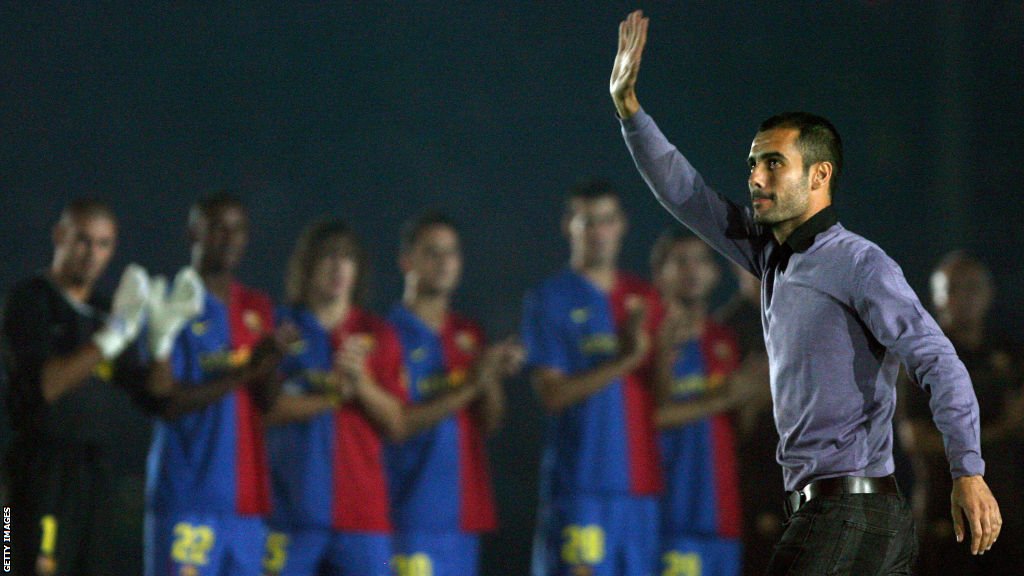
"I don't think I've ever run and chased the ball so much," says former Barcelona striker Eidur Gwidjonsen.
Combined with Cruyff's weekly scouting reports, that friendly was instrumental in convincing the Barcelona board that Pep was the right man for the top job.
"They cultivated a certain style of play," adds Gwidjonsen.
"It was almost like we couldn't get to them. I'm pretty sure some of the first team players didn't take it as seriously as they should have.
"But I still remember thinking to this day, 'Look at that, how are they playing that? Why do they always have an extra player?'
"It was very difficult to put pressure on them."
For the first team, that game was a nightmare.
Ronaldinho was replaced after 10 minutes.
Deko reportedly also struggled in the face of unwavering reserves.
Pep's pressure proved too much even for Barcelona's board of directors.
- Why is it important for girls to play sports?
- The mysterious former English footballer is selling jerseys from the 1990 World Cup in Italy.
- This is the real "Rocky": The Man Who Pathosed Muhammad Ali
A combination of B's promotion to the top flight, a farcical friendly and Rijkaard's reluctance to punish a recalcitrant team led to a change at the very top.
The choice was obvious.
The largest European beast, the invincible disciplinarian of Jose Mourinho?
Or the poetic choice, Pep Guardiola, obsessed with ball possession?
Javier Sala I Martin was at the center of those talks as Barcelona's treasurer and board member between 2004 and 2010.
"Everyone knows we have a problem," he recalls in Pep Guardiola: In Search of Perfection.
"Ronaldinho plays the bongos every night until two in the morning. How to stop it? We need someone to give orders, we need a general.
"Who is the greatest general in the world? Jose Mourinho, right?
"Given the problems we had, the solution seemed obvious."
Unfortunately, Mourinho did not fit into Barcelona's DNA.
"Barcelona's DNA had various aspects. One of them is the way we play.
"We inherited it from Johan Cruyff. We win when we play the Dutch style of football. Cruyff's best student is Pep.
"But Mourinho was winning the Champions League. And that's why there was a big discussion.
"But Joan Laporta said: 'We can't go in Mourinho's direction... he doesn't play our style. He is a defensive coach with counter attacks. We don't even play like that.'
“And, also, he's not a real gentleman. The way he tries to manipulate, he doesn't suit Barcelona's style on the pitch."
Still, everything could have gone either way, as Sala I Martin remembers, had it not been for the intervention of one man.
"Many board members were in favor of Mourinho," he says.
"Laporta consulted Johan Cruyff and asked him if he thought Pep was ready.
"And Johan said it was. And when Johan says it is, it is."
In the end, Barcelona's biggest star insisted on the unproven boss of the B team.
And football has never been the same since then.
Follow us on Facebook,Twitter i Viber. If you have a topic proposal for us, contact us at bbcnasrpskom@bbc.co.uk
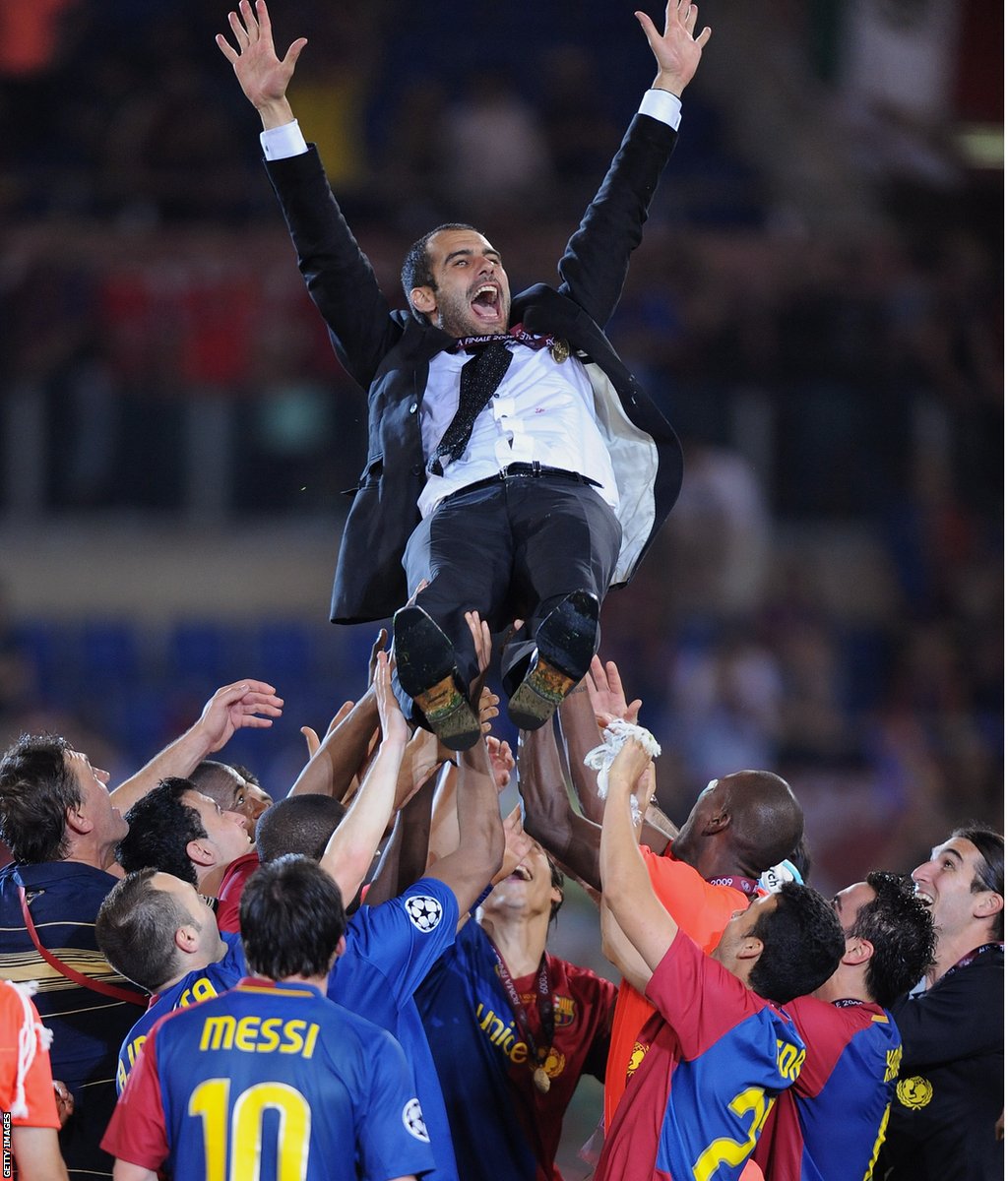
Bonus video:



